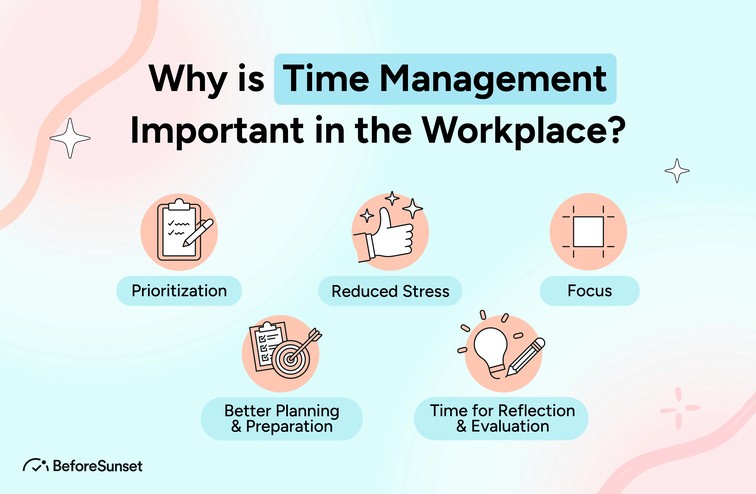I'll let you in on a secret…in order to be successful and get ahead, you need to manage your time. I know this might sound obvious but doing it consistently without fail is absolutely crucial. In fact, time management can have a huge impact on your income, job satisfaction and happiness, the quality of your work life and the opportunities that come your way. But what is it and why is it so important?
What is Time Management?
One must arrange and prioritize their job, responsibilities, and activities in order to spend their time as effectively and efficiently as feasible. This is referred to as time management. It comprises setting goals, formulating plans, scheduling events, and allocating time to various activities in a way that maximizes production and minimizes waste. People who use effective time management skills can work faster, meet deadlines, feel less stressed, and maintain a better work-life balance.
How Does Time Management Improves Quality of Work?
Time management enhances job quality in numerous ways:
Focus and concentration: Effective time management allows people to set up particular time slots for certain tasks. Individuals may focus and concentrate better on their job by reducing distractions and interruptions, resulting in greater quality output.
Prioritization: Identifying and prioritizing work based on priority and deadlines is part of time management. Individuals guarantee that critical work is accomplished on schedule and with the appropriate attention to detail by focusing on high-priority assignments first.
Reduced Stress: Time management helps people stay organized and in control of their task, which decreases stress. Individuals can work more quietly and create higher-quality outcomes by giving enough time for each assignment and avoiding last-minute rushes.
Increased Efficiency: Time management practices such as setting deadlines, breaking activities down into smaller manageable chunks, and employing productivity tools may all help to increase efficiency. When people work effectively, they have more time to devote to each job, which results in higher quality work.
Better Planning and Preparation: Time management entails planning ahead of time and assigning adequate time for planning and preparation. Adequate preparation enables individuals to acquire required resources, do research, and consider their strategy, resulting in better-prepared and higher-quality work.
Time for Reflection and Evaluation: Good time management allows people to set aside time for reflection and evaluation. This allows them to go over their work, make any required changes, and check the quality of their work before finishing and submitting it.
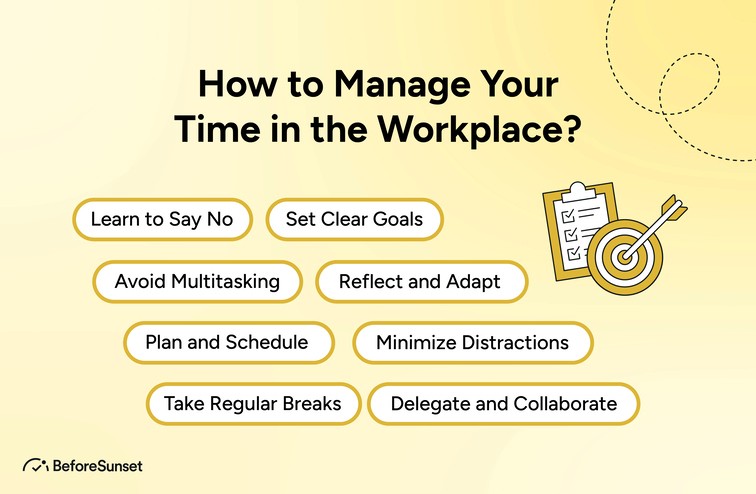
How to Manage Your Time in the Workplace?
To properly manage your time at work, you must employ a number of critical strategies. After establishing defined goals, prioritize tasks based on their importance and due dates. Make a to-do list or use a task management application to stay organized. Larger undertakings should be broken down into smaller, more manageable chunks.
Avoid multitasking and focus on one activity at a time to maintain productivity and quality. You may decrease distractions by turning off notifications and scheduling times to examine emails and messages. Schedule regular breaks to keep focused and revitalize. To avoid unnecessary delays, practice distributing responsibilities and speaking properly with coworkers. Keep an eye on your schedule and make any necessary changes.
Finally, take care of yourself and maintain a healthy work-life balance to ensure long-term productivity and well-being.
What are the Benefits of Good Time Management?
Effective time management has various advantages. It boosts productivity by allowing you to prioritize tasks, manage your time effectively, and focus on high-value activities. Goals are met, and production rises as a result. Furthermore, you feel more in control and organized at work, which reduces your stress levels.
Controlling deadlines and reducing procrastination can help you reduce last-minute stress, making you feel more confident and at ease. Third, it improves work-life balance by supporting you in allocating time for relationships and personal hobbies. If you are better at managing your time, you may set aside certain periods for leisure, hobbies, and spending time with loved ones.
Finally, it enhances overall effectiveness by helping you to make better decisions, save time, and make better use of resources. Finally, good time management fosters achievement, pleasure, and success.
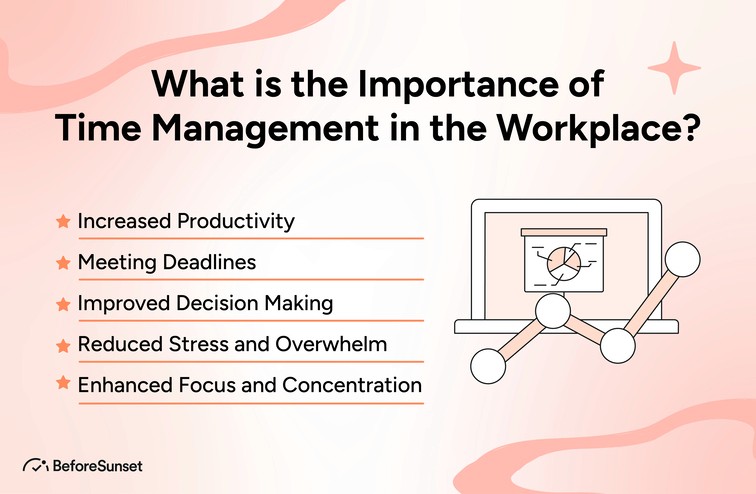
What is the Importance of Time Management in the Workplace?
Time management is critical in the workplace for a variety of reasons. First and foremost, it ensures that operations and projects are completed on time, sticking to deadlines and avoiding unnecessary delays.
This promotes efficiency and output inside the organization. Second, excellent time management helps employees to prioritize their work, ensuring that critical activities receive the attention and focus they require. This reduces the risk of errors or omissions and generates higher-quality outcomes.
Third, maintaining a balanced workload and giving adequate breaks and leisure times helps employees avoid burnout and unnecessary stress. Furthermore, effective time management promotes successful workplace cooperation, coordination, and communication. Employees may also optimize process, plan and allocate resources more efficiently, and respond to unanticipated problems more rapidly.
How Does Time Management Affect Employee Performance?
Time management has a direct and positive influence on employee performance. Employees may boost their productivity and output by employing effective time management practices. They define priorities, manage time effectively, and focus on high-value tasks to ensure that critical deadlines are met.
Effective time management promotes efficiency while avoiding procrastination and wasting time on trivial duties or distractions. Furthermore, it assists employees in more successfully planning and organizing their work, which increases productivity, allows smoother communication with coworkers, and speeds up project completion. Employees are more motivated, engaged, and capable of generating high-quality work on a consistent basis when they are less stressed and feel like they have some control over their assignment.
Tips For How to Manage Your Time at Work Efficiently
Effective time management at work is critical for increasing productivity, meeting deadlines, and maintaining a healthy work-life balance. When there are a lot of tasks, meetings, and distractions, it can be challenging to stay organized and use your time wisely. The good news is that there is excellent information and methods available to help you manage your time at work.
These recommendations can assist you in being more productive, feeling less stressed, and accomplishing more in less time. We'll look at useful suggestions and strategies for time management at work in this section so you may be as effective as possible and meet your professional goals.
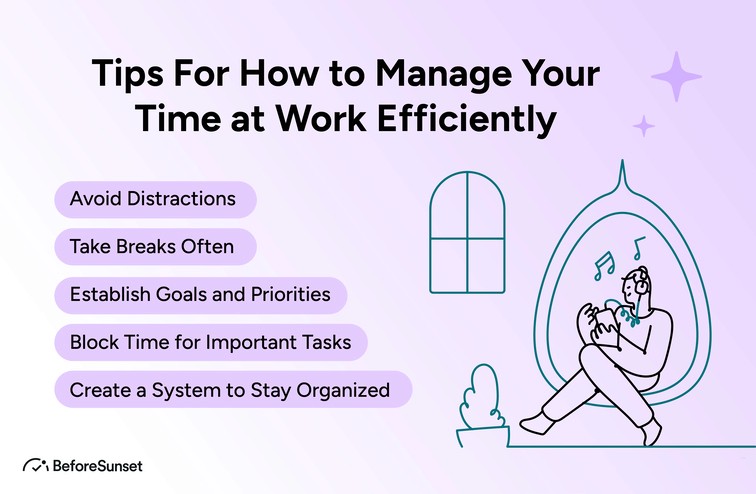
1. Establish Goals and Priorities
Setting targets and goals is an important first step in effective time management at work. By setting precise objectives, you may target your time and energy toward items that will help you achieve your overall success. Begin by determining your short- and long-term goals for your personal and professional lives.
Divide them into smaller activities that can be accomplished in a specific amount of time. After you've determined your objectives, prioritize them based on their importance and urgency. You may then prioritize your time and effort by focusing on the most important things first. Setting goals and priorities gives you clarity and direction, and it helps you determine how to spend your time properly.
2. Create a System to Stay Organized
Effective time management at work requires developing a method to keep organized. In order to create an efficient organizing system, follow these crucial steps:
Use a Calendar or Planner: Use a calendar or planner to remember crucial dates, gatherings, and appointments. Make it a routine to organize duties and set aside particular times for various activities.
Prioritize and Make To-Do Lists: Prioritize your tasks based on significance and urgency, and create to-do lists. Make to-do lists for each day or each week that detail the particular chores you must do. This keeps you on target and guarantees that no crucial chores are overlooked.
Categorize and Delegate Tasks: Sort jobs into categories and assign them to different people based on their nature or the needs of the project. This enables you to set up time periods for different kinds of work. Additionally, free up your time for more important obligations by assigning work that can be performed by others if at all possible.
Utilize Digital Tools and Applications: Make use of digital tools and applications to improve productivity. You may improve your workflow and keep crucial information readily available by using one of the many task management, project management, and note-taking applications that are available.
Keep Your Workstation Clean: Keep your actual workstation clean and orderly. In order to save time, keep equipment, supplies, and documentation in a specified location. Create Logical Filing and Storage Systems: Create a method for organizing physical and digital documents. Use tags, labels, and folders to organize material and make it simple to find and recover later.
3. Block Time for Important Tasks
Blocking time for critical activities is a highly effective strategy for improving time management at work. You may prioritize the completion of critical activities and provide dedicated time blocks for focused work by scheduling them in your calendar. Reduce distractions, turn off notifications, and create a productive workstation during these time periods.
To better manage time and monitor achievement, large jobs can be broken into smaller manageable parts. A frequent schedule review and modification procedure will ensure that each work receives adequate time. Limiting time for critical activities can help you enhance productivity, meet deadlines, and maintain a proactive approach to workload management.
4. Avoid Distractions
Distractions must be avoided in order to stay focused and manage time properly at work. Distractions can slow development, diminish productivity, and waste time on trivial activities. To decrease distractions, begin by identifying common sources of distraction in your workplace, such as social media, email notifications, or loud noises.
As a preventative measure, turn off notifications, set aside certain times for reading emails and messages, and employ productivity tools that block or restrict access to distracting websites and programs. Additionally, make your workstation conducive to lowering outside noise and discuss the need of limiting distractions during designated work hours with your coworkers.
5. Take Breaks Often
Taking regular breaks is an important part of effective time management at work. Despite appearances, regular breaks boost productivity and overall job performance. Breaks allow you to rejuvenate and recharge, decreasing burnout and mental tiredness.
By taking a little vacation from your profession, you may gain a new perspective, sharpen your attention, and be able to focus for longer periods of time. It is critical to plan little breaks throughout the day that are both restorative and productive. Participate in mind-clearing and calming activities such as stretching, walking, or mindfulness exercises.
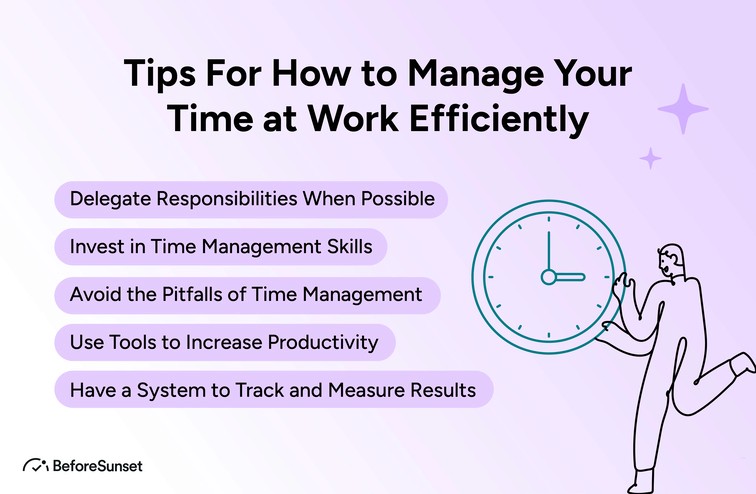
6. Delegate Responsibilities When Possible
When possible, delegating responsibilities to others is an effective time management strategy at work. Understanding your team members' strengths and skills is critical. You can't do everything by yourself. The act of delegating duties or responsibilities to those who are competent of managing them is known as delegation.
Delegating allows you to focus on high-priority projects that require your expertise and attention while freeing up your time. It not only helps with work allocation, but it also empowers and develops your team members by giving them opportunities to rise and exhibit their abilities. Delegating duties successfully boosts productivity, strengthens cooperation, and ensures that projects are completed on time.
To accomplish successful delegation, it is critical to communicate clearly, provide appropriate instructions and encouragement, and maintain open lines of communication.
7. Invest in Time Management Skills
Learning time management skills is a useful endeavor that may have a significant impact on your production and overall performance. By learning efficient time management skills, you may improve your ability to set fair goals, organize your time effectively, and prioritize tasks.
This investment includes learning about and adopting goal-setting, planning, scheduling, and prioritizing procedures. Investigating productivity tools and strategies, attending training sessions or seminars, and seeking assistance from mentors or coaches may all help you improve your time management skills. Developing time management skills has various benefits, including improved work-life balance, less stress, increased productivity, and overall performance.
8. Avoid the Pitfalls of Time Management
It is critical to avoid time management mistakes in order to be productive and efficient. Procrastination is a common error that may lead to unnecessary stress and poor results. To avoid this, set strict deadlines and break jobs into manageable portions. Another error that can lead to a high workload is overcommitting or accepting every job or request.
Learn to prioritize your tasks, delegate them when necessary, and be honest with yourself about your skills. Distractions, such as excessive use of social media or email, can also impede productivity. Establish limits and remove or reduce distractions to create a focused work atmosphere. Last but not least, failing to take breaks may lead to burnout and decreased productivity. Make frequent stops to maintain mental clarity and rejuvenation.
9. Use Tools to Increase Productivity
Using technology to increase productivity is an effective time management method. There are various productivity solutions available that can help with organization, workflow, and task management. Project management software, task management tools, and digital calendars can help with planning, prioritization, and progress tracking.
Tools for collaborating and taking notes make it simpler for teams to successfully communicate and share information. Apps for tracking time provide users with insights into how their time is spent and highlight areas for improvement. Automation tools can help automate regular jobs, freeing up time for more critical tasks.
10. Have a System to Track and Measure Results
A mechanism for monitoring and evaluating results is necessary for efficient time management. It enables you to assess your development, pinpoint opportunities for growth, and make data-driven choices. Set up precise measurements or key performance indicators (KPIs) that are in line with your objectives and keep track of them often.
Use software or tools that can assist you in tracking and analyzing your performance such as BeforeSunset. With the help of this approach, you may gain insightful information on how efficiently you are using your time, identify areas of inefficiency, and make necessary improvements.
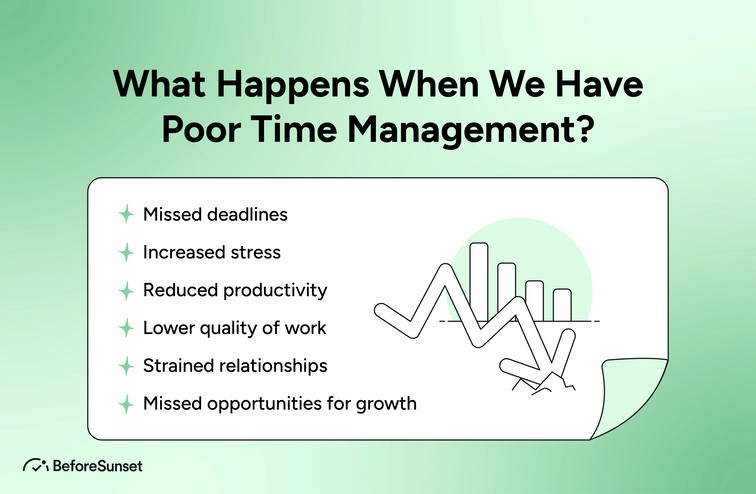
What Happens When We Have Poor Time Management?
Inadequate time management can have a wide range of negative consequences. First and foremost, productivity suffers as a result of disorganization and procrastination, which causes activities to take longer to complete. As a result of missing or rushed deadlines, the quality of the work may decrease.
Second, the constant pressure of unfinished work and looming deadlines tends to boost stress levels. This can lead to burnout, decreased motivation, and overall work dissatisfaction. Furthermore, bad time management can undermine relationships with coworkers and superiors by causing collaborative activities to be delayed or failed.
Finally, inefficient time management impedes both personal and professional growth since opportunities to progress professionally and learn new skills may be wasted. As a result, it is critical to prioritize efficient time management in order to maintain productivity, reduce stress, and achieve desired objectives.
How Can You Improve Your and Your Staff’s Time Management Skills?
To improve your own and your staff's time management skills, consider the following strategies:
Training and Workshops: Provide training sessions or workshops focused on time management techniques and strategies. This can help enhance awareness and provide practical tools for better time management.
Goal Setting: Encourage individuals to set clear and specific goals, both short-term and long-term. Help them break down goals into actionable steps and prioritize tasks accordingly.
Prioritization Techniques: Teach prioritization techniques such as Eisenhower Matrix or ABC Analysis to help individuals identify and focus on high-priority tasks.
Time Tracking and Analysis: Encourage the use of time-tracking tools or apps to gain insights into how time is being utilized. Analyze the data to identify time-wasting activities and areas for improvement.
Effective Communication: Foster open communication to ensure that tasks, deadlines, and expectations are clearly communicated. Encourage staff to seek clarification and provide regular progress updates.
Delegation and Empowerment: Teach and encourage the delegation of tasks when appropriate. Empower staff to take ownership of their work and allocate responsibilities according to their strengths and expertise.
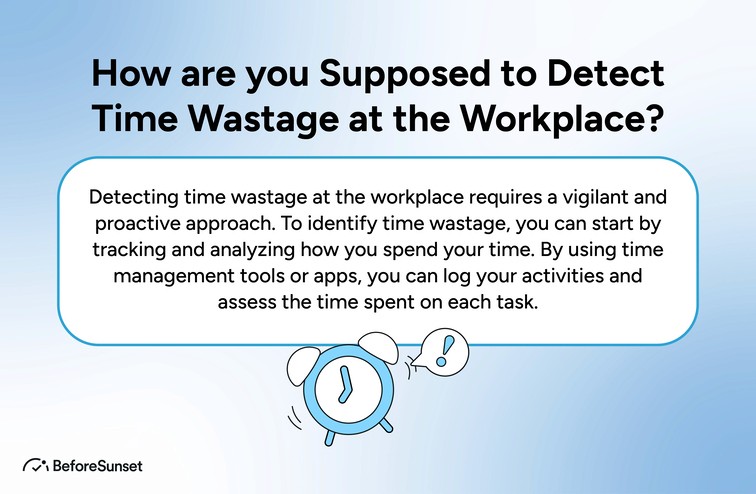
Which Tasks are Taking How Much Time, How are You Supposed to Detect Time Wastage at the Workplace?
Several methods exist for uncovering workplace time leaks and learning how long specific tasks actually need. The first step is to promote the use of time-monitoring software or mobile applications that help people keep track of and evaluate how they utilize their time. This enables for improved prioritizing by highlighting time-sucking tasks.
Time audits, in which actual work hours are compared to projected ones, should be performed on a regular basis. This investigation sheds light on inconsistencies and draws attention to possible time wasters. To better understand where the team is spending their time, it is helpful to promote open communication and regular feedback. Maximizing output and devoting resources where they will have the greatest impact may be achieved by rooting out and eliminating time wasters.
What are the Implications of Carrying Out That Task Later Rather Than Doing It Immediately?
Putting off action until later often has far-reaching consequences. For starters, it can cause work to slow down and reduce productivity overall. Putting off work increases the likelihood that it will be done late, which in turn increases stress and pressure. Delaying one task can have a snowball effect, resulting in an overwhelming amount of work that must be done.
This makes it harder to set priorities and manage numerous jobs at once, which can contribute to a sensation of being overwhelmed. In addition, delays in completing jobs increase the probability that interruptions or unforeseen difficulties may arise, which in turn can disrupt workflow and lengthen the amount of time needed to finish the activity. Therefore, it is crucial to understand the consequences of putting off work and make every effort to get it done on time.
How Can BeforeSunset AI Help You With Time Management?
BeforeSunset is an ideal solution for busy professionals and teams who are looking for an easy and efficient way to manage their time. With BeforeSunset, teams can easily track, visualize, and analyze their time, allowing them to better identify how to manage their time more effectively.
BeforeSunset allows users to manage and schedule tasks, set reminders, track progress, and collaborate with other team members. In addition, BeforeSunset has a number of other features that can help users maximize their productivity, such as goal setting and tracking, task dependencies, reporting, and more. With BeforeSunset, users can easily find ways to make the most of their time, allowing them to get more done in less time.

